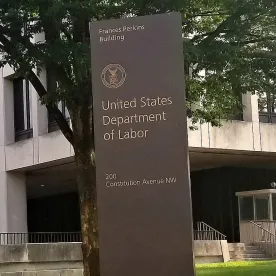As employers adapt to the impacts of COVID-19, wage and hour compliance continues to present unique challenges. To help employers navigate these uncertain times, government enforcement agencies and legislatures have continued to issue new laws, opinion letters, and guidance all employers should understand and act upon. As summarized below, 2020 presented several significant developments regarding wage and hour obligations that all employers should recognize and appreciate as we begin the New Year.
Remote Work Transforms an Employer’s Compensation and Reimbursement Obligations
The pandemic quickly transformed the way many employers conduct their businesses in 2020, with many companies transitioning thousands of employees to remote working conditions. Forced to adapt to the new normal, many workplaces continue to experience permanent changes to their working conditions entering 2021.
In response to the rapid expansion of teleworking, the U.S. Department of Labor (DOL) issued guidance regarding the compensation of remote workers.
Remote Work: Tracking Hours and Compensable Work
In response to the influx in teleworkers amid the COVID-19 pandemic, the DOL issued useful guidance concerning employers’ obligation to track remote employees’ hours. In August, the DOL acknowledged specific challenges presented by telework for employers required to compensate employees for all work that the employer “knows or has reason to believe is being performed.”
Of significance, the DOL recently clarified employers are not obligated to pay employees for work they do not know about and have no reason to know about. Rather, employers are only required to compensate employees for hours worked based on actual or constructive knowledge. In this context, actual knowledge is generally based on the employer’s knowledge of employees’ regularly scheduled hours and employee reports/notifications, whereas constructive knowledge is conferred if an employer could have acquired information regarding additional hours worked through the exercise of “reasonable diligence.”
The DOL also clarified the meaning of “reasonable diligence,” which is limited to what the employer should have known, not what it could have known. For example, employers are not obligated to cross-reference nonpayroll records (e.g., phone records) to evaluate whether employees worked beyond their scheduled hours.
This guidance is particularly helpful for employers as they continue to adopt new policies and practices related to tracking hours for remote-work arrangements as they enter 2021, given the continued uncertainty regarding the trajectory of the COVID-19 response.
Remote Work: Expense Reimbursement Issues
As businesses adjust to the new work-from-home (WFH) norm, employers have raised questions concerning expense reimbursement for costs associated with remote work, including cell phone and internet usage.
Generally speaking, under federal law, employees are entitled to reimbursement if (1) they incur expenses on the employer's behalf or for the benefit of the employer; and (2) such expenses reduce their earnings below the FLSA protected wages (e.g., minimum wage and overtime). As employers swiftly transitioned to a remote workforce, many questioned their reimbursement obligations under this regulation for the first time.
In practice, however, most employers typically face limited risk of running afoul of the FLSA's reimbursement requirements. Reason being, most remote workers are compensated above the federal minimum wage (currently $7.25/hour). Nevertheless, many states have minimum wage rates significantly above the federal minimum (e.g., $8.80/hour in Ohio effective Jan. 21, 2021), making it important to audit expenses incurred by employees to confirm that they do not reduce earnings below the state minimum wage.
Additionally, employers should pay close attention to their obligations under state and local laws. For example, California and Illinois law requires the reimbursement of employees' expenses. Throughout 2021, businesses should revisit their expense reimbursement policies, paying careful attention to their state law requirements and minimum wage thresholds, and changes to wage-payment requirements stemming from a new presidential administration.
New DOL Rule Helps Employers Adopt Flexible Work Schedules and Offer Incentive Pay
In May 2020, the DOL issued a Final Rule expressly allowing employers to pay incentive-based compensation, such as bonuses, commissions, or hazard pay, to employees when utilizing the “fluctuating work week” pay method under the Fair Labor Standards Act (FLSA).
The FLSA guarantees overtime for all hours worked over 40 in a workweek for all covered, non-exempt employees. The fluctuating work week (FWW) method provides an alternative to the traditional time-and-a-half method. Under the FWW method, if certain conditions are met, an employer may compensate an employee at a diminished overtime rate of one-half the employee’s regular rate of pay for any overtime worked that week.
Under the prior regulations, employers were permitted to utilize the FWW method for employees who work fluctuating hours from week to week and receive, pursuant to a “clear and mutual understanding,” a fixed salary as straight time (non-overtime) compensation for whatever hours the employee is called upon to work in a work week, whether few or many. The salary must remain fixed and be sufficient to pay at least minimum wage for all hours worked. Prior to the Final Rule, courts reached inconsistent conclusions as to whether additional compensation (i.e., bonuses, commissions, shift-differentials) was permitted under the FWW pay method.
The Final Rule added language to the FWW regulation (29 CFR 778.114(a)) to expressly state that employers can pay bonuses, premium payments, or other additional pay, such as commissions and hazard pay, to employees compensated using the FWW method of compensation. This granted employers greater flexibility to provide a wider range of supplemental pay to employees whose hours vary from week to week, and eliminates any disincentive for employers to pay bonus or premium payments to such employees.
The rule also clarified several related issues. Most notably, the employee’s hours need not fluctuate both above and below 40 in a work week; the employee need not grasp the nuances of the FWW method for a “clear and mutual understanding” to exist; and any supplemental payments must be included in the calculation of the regular rate, absent an exemption under FLSA sections 7(e)(1)–(8).
The DOL believes that “this rule will allow employers and employees to better utilize flexible work schedules. This is especially important as workers return to work following the COVID-19 pandemic. Some employers are likely to promote social distancing in the workplace by having their employees adopt variable work schedules, possibly staggering their start and end times for the day. This rule will make it easier for employers and employees to agree to unique scheduling arrangements while allowing employees to retain access to the bonuses and premiums they would otherwise earn.”
Prior to the Final Rule, uncertainty around the application of the “fluctuating work week” deterred many employers from using this method of paying for overtime. In a statement by wage and hour division administrator, “This final rule will provide much-needed clarity for job creators who are looking for new ways to better compensate their workers. As employers navigate the challenges of the coronavirus, the rule enhances flexibility to provide hazard pay, and to promote health and safety in the workplace through flexible work schedules that stagger start and end times and implement social distancing in the workplace.”
New DOL Rule Allows Non-Tipped Workers to Participate In Tip Pooling and Eliminates the 80/20 Rule
In December, the DOL issued its long-anticipated Final Rule addressing which employees may legally participate in “tip pooling” under the Fair Labor Standards Act (FLSA) and the conditions under which employers may claim “tip credit.” The Final Rule is effective 60 days after publication in the Federal Register and constitutes a major departure from past guidance.
The Final Rule updated the DOL’s tip regulations to allow tipped employees in the hospitality industry (e.g., servers) to pool tips with non-tipped workers (e.g., back-of-house cooks and dishwashers), in situations where the employer pays the tipped workers equal to or greater than the minimum wage, in lieu of taking a “tip credit” (that is, paying tipped employees a subminimum wage).
The DOL acknowledges that tipped workers are facing significant uncertainty due to the ongoing impacts of the COVID-19 pandemic, “but believes that the justifications for the Rule remain as strong as—if not more so than—before the pandemic.” The DOL stated, “[m]ore flexibility in compensation and labor allocation will help businesses retain workers and maintain capacity. Further, the increased cooperation and efficiency that the final rule promotes will help businesses maintain quality of service—and therefore support tipped-employee compensation and provide increased certainty to tipped workers—at a time when the industry as a whole is struggling.”
Regardless of the novel approach, the Final Rule makes clear that an employer’s manager and supervisors may not retain tips received by their employees for any purposes, regardless of whether the employer takes a tip credit.
The Final Rule also amends the DOL’s regulations to eliminate the so-called “20 percent” or “80/20” Rule, which previously limited the percentage of time a tipped hospitality worker could spend performing non-tipped duties (i.e, setting up and breaking down before and after a shift) under circumstances where the employer claimed tip credit.
Consistent with the amended regulations, an employer may take a “tip credit” for time that a tipped employee spends performing “related,” non-tipped duties (either contemporaneously or for a reasonable time immediately before or after performing the tipped duties). These amended regulations address which non-tipped duties are “related” to a tip-producing occupation. Examples of such “related” duties include “cleaning and setting tables, toasting bread, making coffee, and occasionally washing dishes or glasses.”
Conclusion
Your Wage/Hour Team at Dinsmore will continue to keep you and your business up to date on your wage and hour needs. If you have any questions regarding the foregoing sections or would like to discuss your current wage and hour practices, please feel free to reach out, and we are ready to assist. Happy New Year to all!




 />i
/>i

